#the king writes meta
Text
I love Oda but man is INSANE for not making the timeskip more relevant to the straw hats outside of power ups
Brook: Literally a rockstar??? There should have been a running gag where people ask Brook for his autograph at every island they visit! It would be so funny if some villains were starstruck fans trying to keep it together during a fight!
Sanji: It would have been great if the newkama recipes came up more than once. There could have been a gag where Sanji stops in the middle of a battle to literally cook a power up for the crew. Imagine this man dicing onions in Onigashima, force-feeding Zoro a stew during his fight with King
Robin: She worked under Dragon for two years, met Sabo and Koala and maybe Ivankov, she probably knows the Army's entire plan to take down the gov and yet it never comes up! Does she know about Kuma? Nika? The five elders? Does she secretly communicate with the Rev Army????
Zoro: I love the idea of Perona teaching Zoro about fashion. It wouldn't have plot relevance but imagine him busting out some fashion tips out of nowhere every so often.
I'd love to hear more ideas, the missed opportunities here haunt me.
Edit: link to ongoing collection of headcanons since some people only see the first four ideas
#one piece#straw hat pirates#sanji#nico robin#roronoa zoro#op meta#post timeskip#soul king brook#op spoilers#write up
10K notes
·
View notes
Text
Disney doesn't need to change "the formula." That's the last thing that Wish proves.
What Wish proves is that "the formula" only works when you know why the ingredients are in it, and you use them the correct way.
The Princess Character is meant to wish for only half of the movie's message, and go through an adventure that teaches her what the other half is; what her dream was missing. Ariel dreamed of understanding but she was missing love. Tiana dreamed of achieving her goals but she was missing faith. Jasmine dreamed of freedom but she was missing trust. Belle dreamed of adventure but she was missing being understood.
The Villain is meant to highlight the opposite of the movie's message. Jafar gets what he wants through trickery and manipulation; that's the opposite of Aladdin's "truth will set you free" message, and he gets imprisoned in a lamp. Scar thinks being a King is having his way all the time and can't learn from his past of living in Mufasa's shadow; that's the opposite of The Lion King's "Let the past remind you of your responsibility to selflessness." Gaston loves only himself and is always obsessed with appearances; that's the opposite of Beauty & the Beast's "true love is found within a heart of self-sacrifice." That's what makes them such good villains. (and that clear direction is what drives good villain songs, since Magnifico's is what everyone is talking about)
The sidekick is supposed to compare/contrast with the main character's qualities. Abu is a greedy thief, which is what everyone in Agrabah thinks Aladdin is; when he scolds Abu and teaches him selflessness, it shows us who Aladdin actually is. Flounder is easily frightened and looks at the glass half-full; when Ariel coaxes him and leads by example, we see her bravery and positivity reflected in Flounder's tiny character arc. Timon & Pumbaa do whatever they want all day just like young Simba always dreamed of; when Simba goes to live with them, he finds that "getting his way all the time" makes him forget who he really is and feel empty.
The setting is supposed to show off the characters and highlight the movie's message. Rapunzel's tower is designed to be pretty on the inside because of her influence; if it were too dark and prison-shaped, we'd wonder why she didn't work up the courage to leave sooner. Just like how Quasimodo has made his corner of the bell-tower beautiful, too; they're taught the world is cruel and they're not strong enough for it, but they make their own worlds beautiful enough to hint that that's wrong right from the start. Ariel's grotto is shaped like a tower with no roof so that she only has one window to the forbidden Surface, and it's the light that comes from that forbidden world into her dark grotto which literally makes her able to see human things differently. Tiana's apartment has no interesting features except her father's picture, a perfectly made bed, a drawer with no extra outfits but stuffed with tip money, and only two dresses; both of which are for work.
None of that is happening in Wish, because they didn't know why the formula ingredients are there. Disney needs to understand and return to the formula the right way; forgetting it was what got them here.
Asha learns nothing to add to her dream, unless you count "the power to grant wishes is in me." Which you shouldn't, because we didn't even know she was confused about that until the animals sang a song that was completely off-topic and she had the chance to jump in and sing "I'm a Star!"
Magnifico does not demonstrate the opposite of Wish's message effectively because his character has nothing to do with a philosophy against making wishes, and everything to do with power. (He is the strongest character in the film. But because the message and core concept of what wishes are are so bad, that's not saying much.)
Valentino, and Asha's friends, do not highlight anything about her character through compare/contrast. Valentino is brave and all over the place. Her friends are seven-dwarfs parodies. Happy, Doc, Sneezy, Dopey, Bashful, Sleepy, Grumpy. None of that contrasts with Asha's vague characterization of "cares too much." None of it compares to that characterization, either.
The setting is empty. There are no interesting details that teach you something about any of the characters. None in Asha's home, none in the neat-and-tidy one-dimensional forest, none in the Rosas square, and none in the bland, empty castle. Magnifico's study is the closest anything gets; there's a loose concept that all of Asha's friends have to work together to open the roof, and take a leap of faith to weigh the pulley system down. Unfortunately, none of these characters is shown struggling to work together, OR to take leaps of faith, at all, before this point.
The ingredients of the formula are in Wish. They're just not being used correctly. This is how not to use the formula; it's not the formulas fault. If it ain't broke. They should never have let people convince them to try and fix it.
#Disney#critic#wish#wish 2023#wish hate#Disney's wish#Disney criticism#wish Disney#get it together Disney#real Disney#realdisney#notmydisney#Mulan#Tangled#The Little Mermaid#The Lion King#Aladdin#Meta#writing#writing advice#Disney princesses#Princess critiques#the Disney formula#formula#character analysis#animation#set design#Rosas#Magnifico#Asha
2K notes
·
View notes
Text
Soulmate AU: First Words + End of the World ; requested by @justwannabecat!
Duke has long since accepted that he doesn’t have great luck. Most things in his life tend to go wrong very quickly, or complicate situations he was already struggling in (see: being a meta and getting his powers in the middle of a fight). Having an incomprehensible soulmark is an unpleasant discovery on the morning of his nineteenth birthday, but not entirely unexpected.
He had been hoping for something simple, a common one like hi it’s nice to meet you or sorry, didn’t mean to bump into you.
What Duke gets instead isn’t even words.
Scrawled across his left hipbone is a string of symbols glowing a faint green. They’re not in a language he recognizes, and the symbols seem to move, shifting ever so slightly so they look different every time he blinks.
“Well,” he says after a solid five minutes of staring into the mirror, unable to rip his eyes off his soulmate’s words, “I hope theirs looks nicer than mine.”
He spends his birthday in a bit of a daze, enjoying time spent with the Waynes and his friends. It’s hard to be fully present when he’s all too aware of the soreness on his hipbone flaring up each time he moves. It’s hard to keep his mind off of it, wanting nothing more than to search for answers, unravel the mystery of his soulmate’s first words.
“Something on your mind?” Jason asks, as the attention shifts off of him for a brief moment as Harper and Cullen get ready to leave and everyone rushes to give their goodbyes,
Duke shrugs, carefully keeping his hands still so they don’t drift to where his soulmark is hidden beneath his clothes. “Yeah. Nothing you need to worry about, though.”
Jason looks him over critically, then nods.
Duke resigns himself to being investigated by the rest of the Bats. If he’s off enough that Jason had to comment on it, then that means everyone’s noticed and are trying to figure out what’s happened. They’re not going to ask him, because they think he needs space to work through whatever’s got him so distracted, but they’re also not going to just do nothing.
This won’t be the first time they’ve done this. Duke expects it. Frankly, it would be stranger and much more concerning if they didn’t try to dig up all his secrets the moment they caught wind of him hiding something.
He’ll tell them about getting his soulmark soon. Soulmarks can appear on any birthday between the ages of thirteen to twenty five; they might suspect he got his, but they won’t be able to confirm.
For now, Duke can keep his soulmate’s first words (whatever that gibberish means) to himself.
He makes the decision then and there, as his birthday party winds down, to tell them in a week.
And because his luck is abysmal, a world ending threat hits five days later and suddenly there is no time for soulmarks and first words.
Duke is the last to arrive at the Fortress of Solitude, hitching a ride from Superboy to get there. The biting cold and the harsh winds keep the place far from the reaches of the rest of humanity, surrounded by nothing but deadly white.
Desolate as the landscape is, it’s still in better shape than the rest of the world.
Things would be better if it was alien invaders. It would be more bearable if some sort of cosmic colossus tried to eat their solar system. At least then there would be something physical that they could fight.
Instead, the world is breaking apart, the sky and earth both fracturing to reveal glowing green faultlines. Timelines are getting mixed up and muddled; just yesterday, Duke had to evacuate a building that had been demolished forty years ago, then stop a gang leader who wouldn’t be born for another eight years from taking over a neighborhood block and holding the residents hostage. Strange creatures are appearing out of nowhere, crawling out of shadows and tide pools and from beneath the roots of trees, all horrible, monstrous things that go after people with teeth and claws.
The Flashes and the rest of the speedsters are nowhere to be found. The last time anyone get communication from them, it had been Impulse sending Red Robin a glitchy, barely audible video chat saying something along the lines of “trying to fix—unstable—keep us here—never been alive before.” All things that are very concerning to hear, made worse by the fact that no one had been able to contact them at all.
The quiet loneliness of the Fortress of Solitude is a welcome change from the constant screaming, death, and destruction that’s taken over Gotham as well as the rest of the world. Last he heard, even Justice League China was at the end of their rope.
“In here,” Superboy instructs, guiding Duke through the halls. There’s no time to look around at Superman’s secret base. All his focus is stuck on staying conscious for another few hours to see if this gathering of heroes is able to find a solution to the world breaking apart.
Batman stands besides Superman. Both nod at Duke when he enters the room. Wonder Woman is watching over John Constantine as he writes something on the floor, muttering under his breath. The rest of the Justice League lean against each other, visibly exhausted as they wait for Constantine to finish up what he’s doing. A few other heroes are here too, and Duke goes to join them where they lean against a wall, fighting to keep their eyes open.
“Hey,” he greets, voice low. “Hanging in there?”
Wonder Girl sighs. “Somehow. I don’t know how much longer we can do this. There’s just too much…”
“We’ll get through this. I mean, even without us out there, plenty of civilians have formed rescue and relief groups to help with keeping things under control,” Speedy says, gently knocking her arm against Wonder Girl’s. “We just gotta keep going. No giving up.”
“What’s this plan, anyways? I just heard that they needed me here to some attempt to fix things.”
“Well, without the speedsters, you’re kind of the only one who can help with time and power related stuff,” Speedy says.
“That’s definitely a stretch. My powers don’t really have anything to do with time. It’s all just light and shadow.”
Speedy shrugs. “Well, you’re here, aren’t you? Too late to complain about it now.”
Duke doesn’t get a chance to say anything else when a loud clap catches his attention. The entire room goes still and silent as Constantine stands up and surveys the circle and symbols he’s written, taking up an entire corner of the large room.
“Alright,” he says. “Time to get started. Remember, let me do the talking. If you have to speak, it’s only to back me up or when a question is directed to you.”
Batman nods to the other Justice Leaguers, and suddenly everyone is falling into formation behind Constantine. Duke hurries to join them with Wonder Girl and Speedy, taking a place on the edge of the group where he’s a little closer to the circle than the others.
Constantine begins chanting. His voice is steady though none of the sounds make any sense, refusing to form themselves into recognizable words, and the air the in the room feels heavier. The chalk circle glows a blinding white and Duke can see magic swirling through the air, his power kicking in the let him watch as reality tears and a glowing star in the shape of a boy comes out of it.
Duke blinks, forcing his power down. The hypnotic swirls of magic fade from sight, but the boy still glows, bright and terrible as he floats above the circle and surveys them all. A crown engulfed in blue flame hovers above his head and the fabric of the cosmos is draped over his shoulders as a cape.
Just from presence alone, Duke can tell that this figure is now the strongest existence in this universe. He hopes this boy king is kind; no one, not even Superman, would be able to beat him in a fight.
The boy king opens his mouth and speaks, but it’s not words than comes out. A strange static like sound emerges, but light and almost melodic.
His left hipbone burns.
Duke gasps, hand flying down to it, and the boy king’s gaze snaps to meet his.
The world stands still. No one moves. No one dares to breathe.
And then the boy king drops to the floor and walks out of the circle.
“I thought you said that would hold him!” Batman hisses at Constantine, who is looking more and more distressed.
“It was supposed to! I wrote it specifically to hold the King of the Infinite Realms!”
The boy king glances at Constantine. This time, when he speaks, it’s in smooth English. “Did you name the king in your circle?”
“Yeah, I named Pariah Dark… Bloody hell, you ain’t him, are ya?”
“No,” the boy king smiles, “I’m Phantom.”
The cape and crown fade away, and suddenly it’s not an all powerful, terrifying king standing before them, but a young man with white hair and green eyes who looks Duke’s age. Like he could be any other new generation hero in the room.
“Phantom,” Duke repeats lightly, just under his breath, but it makes Phantom look at him again.
He walks forward, ignoring the other heroes’ aborted attempts to stop him, coupled with Constantine’s frantic back off motion happening behind him. Phantom leaves the circle and the Justice Leaguers behind to stand before Duke, a soft smile on his face.
“Hi,” he says softly, “I dreamed of you.”
“You—what?”
“I dreamed of you. I have for years now. To think that being summoned was what made us meet—” Phantom breaks off into a breathless laugh.
Duke swallows, then drops his had from where it had been pressed against his hip. “So we’re really—? You have my first words too?”
In the corner of his eye, he sees Batman stiffen up. Maybe he should have just told them the day after his birthday, but in Duke’s defense, this is the definition of extenuation circumstances.
“First words?” Phantom repeats, “Is that… Do we have different soulmate connections?”
“I think so. Here, everyone gets the first words their soulmates say to them appearing somewhere on their body.”
Phantom’s gaze darts down to Duke’s hip, then back up. “Oh. I get dreams. Where I’m from, we dream of our soulmates, and the closer we get to meeting them, the more we remember the dreams.”
“And you dreamed of me.”
“I did.”
“As touching as this is,” Constantine interrupts, and Duke gets to watch as Phantom rolls his eyes, “We summoned you here for a reason. Our world is falling apart at the seams and we need someone powerful, from the Realms, to help us fix it.”
“Okay.”
“...What do you mean ‘okay’?”
“I’ll help,” Phantom says.
“Just like that? No deal to be made, no price to be paid?”
“Just like that. I’m not one for deals anyways. If I can help, then I will. But I do want to see what the problem is with my soulmate by my side, if you don’t mind.”
Batman steps in, fixing Duke with a steady gaze, a barely noticeable tilt of his head. “Signal?”
“Yeah I’ll go with him. Of course I will. The sooner the better, in fact, because everything’s gone to shit.” Duke turns to Phantom, taking hold of one of his hands. “It is really bad out there,” he warns, “If you need help—”
“I’ll ask for help from others in the Realms,” Phantom says. “No offense or anything, but if it’s really that bad, I doubt living mortals will be able to do much to fix things. It’s why I was summoned, right?”
“Right. Let’s get to it, then.”
There’s a flash of mischief in Phantom’s eyes, and cheeky grin stealing across his face for a moment, before he says, “Aye aye, captain!” and picks Duke up like he weighs nothing and flies up through the ceiling.
Duke is able to hear everyone’s surprised, panicked shouts before they’re outside the Fortress of Solitude and Phantom is flying them away. He only needs a few directions from Duke before he finds the first of the large fractures in the sky.
“Yikes,” is all he says, which is not a great thing to hear. “I think I know how to fix it, though. We’ll need to do a little investigating as to who, exactly, started messing around with reality, but once we find the source, it’ll be an easy fix.”
“That’s the best news I’ve heard all week.”
“Even better than meeting your soulmate?”
“I haven’t slept for more than four hours all week. Knowing there’s an end in sight beats everything else.”
Phantom laughs, throwing his head back and Duke can’t help but drink in the sight of him, so ethereal and bright and full of life. “Fair enough! Got any ideas as to where we should start?”
“I’ve got an entire crew of detective vigilantes,” Duke replies. He’s not taking any more chances. No more waiting to talk about important things; he messed up by keeping his soulmark to himself, so he needs to make sure everyone meets his soulmate before shit goes south again.
“Let’s go find them, then!”
They take off again, soaring through the skies that are barely holding themselves together.
The world is still ending, and every hero is being stretched thin, but held carefully in Phantom’s arms, racing head first into a solution, Duke can’t help but feel that everything’s going to be alright now.
He’s had enough bad luck. Now, his soulmate with him, bearing the title of King with grace, things are finally starting to look up.
#ghostlights#dc x dp#dp x dc#dpxdc#dcxdp#dc x dp fic#prompt fill#my writing#when its the end of the world but youre soulmate is here and ready to help fix it#meanwhile constantine had gone ON and ON about how dangerous summoning realms beings are#and all the precautions they have to take and how to be specific when making deals etc etc#it was supposed to be only the justice league but with the world ending they wanted their proteges and allies with them in case things#went wrong w the summoning. and with the rest of the bats helping out in gotham and around the east coast#signal gets to join batman. plus hes got his meta powers that could help in the worst case scenario#NO ONE predicated signal and the GHOST KING being SOULMATES#batman leaves for gotham immediately. updates the rest of the team w 'ghost king successfully summoned. he's signal's soulmate.'#and does not respond to ANYONE after dropping that bomb on them lol#they do all get to meet phantom when they join forces to find whatever doomsday cult caused all this#and the world gets saved!!#also. semi related to all this. the speedesters are gone bc time went wacky and they tried to fix things. but then the speedforce kinda#came to life and trapped them. so they have been lowkey eaten by the speedforce bc the speedforce is the true eldritch monstrosity here#anyways. thanks for the prompt!!#working on ur other two prompts now :)
1K notes
·
View notes
Text
Some thoughts on Lucifer's mental health, relationships, and role as king of hell!

Lucifer’s perception of himself as the king of hell is really interesting to me because he’s very blase about it in canon while totally using it when it suits him.
I think it’s really telling that the first time he actually brings it up himself is when it’s something he can leverage to help Charlie out. He reads to me like someone who objectively knows that he’s the hottest shit in town, but also just doesn’t really think that it matters most of the time because it's not relevant to his personal problems. Being Lucifer Morningstar did not allow him to achieve his goals in petitioning heaven. Being the most powerful person in hell didn’t even un-fuck his family life!
...Except for when suddenly it might in fact help un-fuck his relationship with his daughter.
It's the main thing he can desperately and dramatically showcase as a worthwhile reason for Charlie to maintain a relationship with him, because he as a person is depressed, half-functional, and barely has enough spoons to pay attention to a conversation he's having with her while he's actively having it, nevermind remembering their last one.
He wants to! And it doesn't start with his song at the hotel! It starts with him answering the phone, heavily fumbling actually connecting with Charlie despite clearly desperately wanting to, and then realizing she's asking him for something and promptly choking on his tea before excitedly telling her, "Yeah! Of course! Anything within my power is yours for the asking, you just name it." He knows that there is a great deal 'within his power,' and he's happy and relieved that he can offer her that!
Lilith has been gone for years but he's still wearing his wedding ring. His walls are still covered in family portraits. He's just been sitting in his room making thousands of rubber ducks he thinks suck instead of ruling hell, because his daughter liked that one duck he made one time.
Charlie needed him to support her in her mission, but damn did Lucifer also need Charlie to get him out and moving and actually doing things again.
Anyway, someone get this man on an SSRI.
#hazbin hotel#hazbin lucifer#lucifer magne#lucifer morningstar#meta#personal#text posts#long post#expanding on some comments I made about him in an ask!#can't WAIT to find out what his and Lilith's deal is#my funky little depressed king#Alastor took him not knowing who he was personally#but after his comments about watching TV and not remembering Charlie's hotel#I think it's pretty clear Lucifer is just out of touch as hell because he hasn't got the spoons to function like people think he would#ETA: I tried to write a little rambling meta post failed to get my feelings out and now I'm 3k words into a fic#I NEED TO JUST REMEMBER THAT FIC COMMUNICATES MY FEELINGS BETTER..........
723 notes
·
View notes
Text
Writing prompt: Danny failed science and Temperature affects the weather!!!
So when a cold front meets a warm front is can cause a storm, sometimes they can become extremely dangerous….
Danny has been really stressed lately with college applications and exams, plus the fact that his powers have been getting stronger lately. So one day he flys out to the middle of nowhere and lets off some steam in the form of letting his ice core go a little crazy. He does this every now and then to help him destress, today he used a little more power than usual but no big deal right?
Wrong. One week later the justice league is at his door and confronting him about a series of severe storms that have been created that they managed to track the energy source back to him.
Now they are trying to confront him about being a weather powered meta.
To be fair he was fighting the box ghost when they were learning about hot and cold fronts, how was he supposed to know they could form tornados?
#danny phantom#ghost king danny#dc x dp#brain vomit#dp x dc#writing prompt#I don’t have time to make another one!#ice core#pay attention in science class kids#hot+cold+water=bad day#justice league#okay but imagine red tornado#forcing Danny to sit through an entire lecture#on the water cycle and how cold air can affect meteorological events#Danny is trying so hard to convince them he’s not a meta#he’s just dead
943 notes
·
View notes
Text
The fact that Main-verse Ooo is as good and as kind as it is (relative to the other universes shown so far, at least, it's obviously not perfect) all because of the same character that starts off as the OG series' antagonist, the person we were made to see as the bad guy (albeit an often ineffectual one) for several seasons, is making me lose my mind.
Imagine finding out the guy you spent your childhood beating up and saving princesses from is in fact a driving catalyst behind you being able to exist, and not only exist but also live in a world that knows what kindness is. All because that man, the same man who you've witnessed do terrible things, once met a little girl and taught her how to be good.
Simon's story really shows us that even if you lose your way and forget how it is to be good yourself, the world keeps the memory for you. That act of love Simon showed Marcy by protecting her and seeing her as more than the monster she thought herself to be created ripples upon ripples, small at first but eventually enough to help give their wreckage of a world—a world that easily could have been forsaken, its goodness overlooked because of its inhospitable remains—a chance to grow into something beautiful. Because of those very same ripples Simon created, the people of Ooo grew up in a world where they know enough about kindness that they were able and willing to spare the 'bad guy' some, to see beyond the wreckage and allow him to grow too.
In saving Marceline, Simon helped to not only to save the world, but also himself.
#fionna and cake#fionna and cake spoilers#adventure time#simon petrikov#ice king#marceline abadeer#simon and marcy#meta#this was just a phone note to get thoughts out of my system but then it came out semi-coherent#so welp guess i'm writing meta now. i'm really in the deep end now. but yeah...Ice King and Simon's story being about the power of kindness#A cruel world requires constant cruelty to be maintained. But kindness? That reaches across time. one act of kindness sparks another#'I need to save you but whose going to save me?' That act of love and compassion is gonna save you ya dingus....eventually#In a less kind world finn and Jake could have watched those tapes about Simon and still decided IK was a hopeless cause.#That he was too far gone to be saved. But they didn't. They chose to treat him nicer and actually be friends with him.#One thing i always loved about IK's story is that he didn't have to completely change himself for people around him to treat him better#They changed their perspective and were kind to him and it was THAT that helped him change. to grow beyond the 'antagonist' role#to quote my go to and all time favourite good place quote:#'the point is people improve when they get external love and support. How can we hold that against them when they don't?'#Arrgh sorry I just always loved Ice King's arc in the show. From pesky antagonist to the person Finn dived into a chaos god to save#(the world's new beginning and its near ending being all because of simon. he has such main character energy and boy does he not want it)#And now we're getting Simon stuff and I'm so normal I'm so normal I'm so normal (<- has never been normal about this character)#(i...i have many MANY drawings of ice king and simon from 2015 and the years after. i was doomed from the start. F&C was the final straw)#(as was reading marcy's secret scrapbook recently...and here i thought i'd truly reached the capacity of hurt i can feel about these two)#Going insane over these last two episodes. 'she didn't have a me'. Fionna and Simon bonding. Gumlee kiss. PETRIGROF BACKSTORY#and the implication that Simon isn't remembering it accurately? Their sweet sounding love song actually foreshadowing their issues?#I am clawing at the walls. thank you AT crew you are enriching the enclosure that is my brain
465 notes
·
View notes
Text
this is a joke but it’s also…almost the meaning of something in drafts
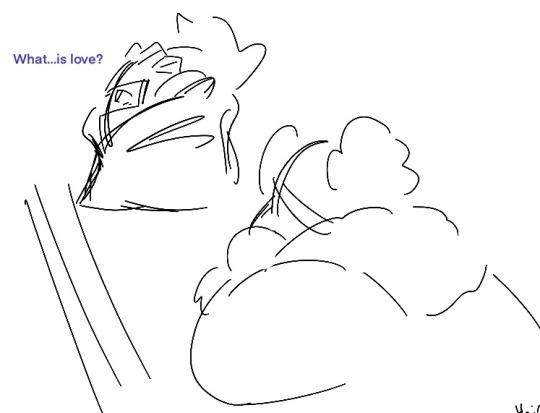
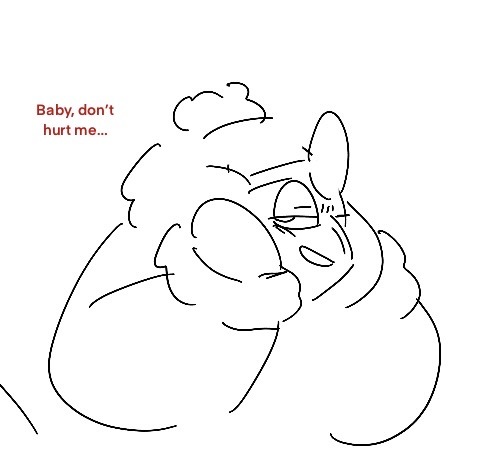
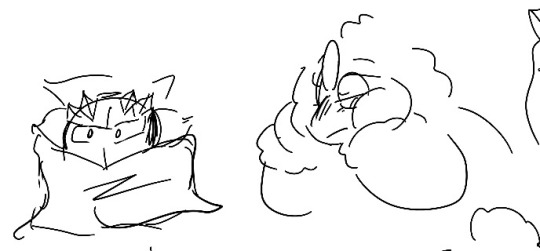

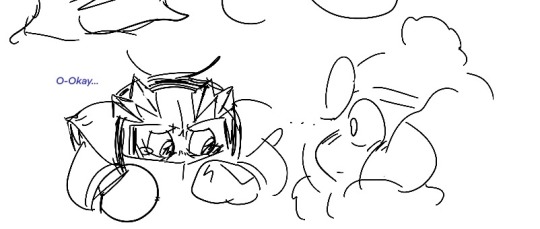
#posts that only make sense to me#kirbyposting#my art or something#meta knight#king dedede#metadede#quinn does comics#okay sorry for the mtdd flood this week i had a lot saved up and actually drew for once#im probably gonna try to do more writing…which is what this is about#maybe some more mags stuff soon#love walking the fine line between shitpost and almost serious
219 notes
·
View notes
Text
sorry for saying i would make refs and then never doing it. the first two are from a few months ago and the other two are from the past couple days




#kirby#splatoon#kirby au#meta knight#sword knight#blade knight#meta-knights#bandana waddle dee#king dedede#susie haltmann#rhyn's art#still sorta writing something with these guys#idk if i’m ever gonna finish it or share it but. i love splatoon :]
106 notes
·
View notes
Text
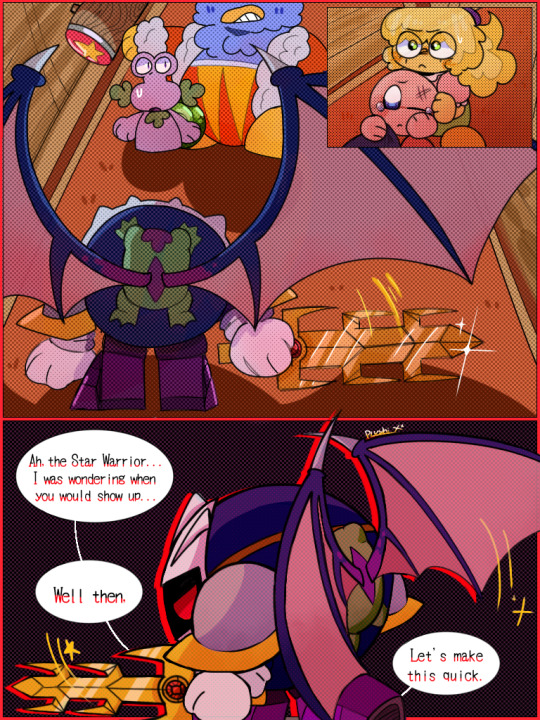
I still really like Frog Wild. I think it's a neat episode.
But what if Meta Knight
#THIS TOOK 42 LAYERS#i am going to lose my mind if i have to draw galaxia again today#also !!!! another fanfic idea i will NOT be writing#fake comic page#fake comic#im never doing this again#just kidding i probably will#and my sanity will suffer for it#meta knight#king dedede#kirby#tiff kirby#fumu kirby#fumu#escargon#escargoon#galaxia#galaxia sword#me not knowing how backgrounds work and desperately pretending i do#turtle's art hoard#FRICK I JUST NOTICED A MISTAKE#sggsfshds im not changing it again#also tumblr made it blurry please click on it
338 notes
·
View notes
Text





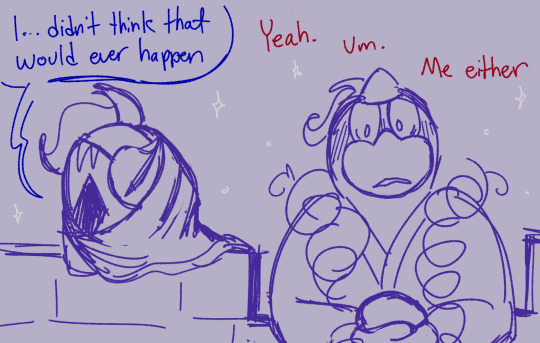

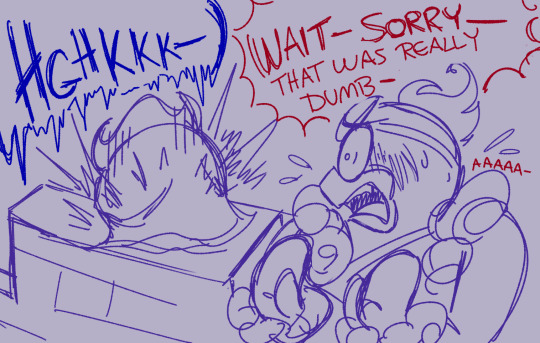
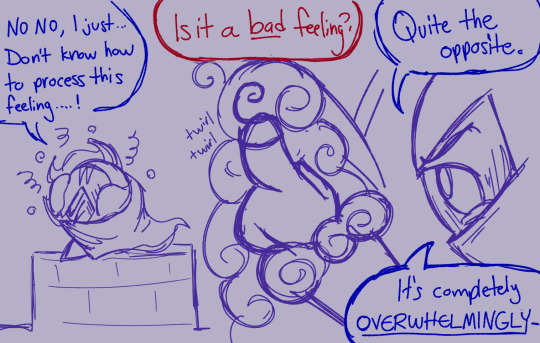

A confession🌟 (Part 2)
(Part 1)
(Part 3- Final)
#to be continued#this is what people in the business call A Doodle Gone Rogue#I may write a dozen more confession scenarios in the future but here is the one I just came up with hehe#I have no grand backstory for this arc all I know is that I must finish this fluff through to the end#neither of these goobers know what they’re doing and I love it#metadede#king dedede#meta knight
465 notes
·
View notes
Text
I've been rotating Kirby characters in my head again and thought up a story in which Kirby gets pulled into an alternate timeline and ends up in a dystopic version of Dream Land where everything is dark and scary and miserable, King Dedede has been deposed and overthrown by an evil villain who's taken over the land and he's gone missing, and Meta Knight leads a band of revolutionaries in Dedede's name (said revolutionaries being the Halberd's crew + Bandana Waddle Dee)
I have yet to figure out what happened to this timeline's Kirby, since everyone is supposed to know who he is and be surprised to see him, so I guess that implies their timeline's Kirby is gone? :(
but anyway, rough plot goes as such---Kirby ends up in this alternate timeline and doesn't understand what's happened. his first indicator of what's happened is finding wanted posters of people he recognises, like Bandana and the Meta-Knights, and when he finds Meta Knight's wanted poster, he's even more confused. what little he can understand of what the poster says is saying he's committing crimes against the king, but why would Meta do that? aren't Meta and Dedede friends? didn't they call each other sworn partners? what happened?
he eventually encounters the rebels themselves and they're shocked to see him, and he's shocked to see them, especially Meta Knight, the rebel leader, wearing Dedede's robe over one of his shoulders (like a one-shouldered cape) and his men bearing the crest of the king. Meta and the others explain to Kirby that Dedede had been overthrown by an evil being and has been missing ever since, the only things left of him being his crown and robe (the latter which Meta stole from the villain). the villain calls himself the king, and has told the people of Dream Land that Dedede is gone and is never coming back, but Meta Knight refuses to believe that, citing that he knows the king is out there, he can feel it, and he won't rest until he beats the blackguard who deposed him and finds Dedede. thus he created the rebel group out of his own men (and Bandana joined) and dubbed them the "Knights of Dedede". (now I am a metadede shipper so that would be why there's a lot of unending devotion vibes here but if you're thinking this could be out of character for Meta Knight, I feel like the other reason he named his band of revolutionaries the Knights of Dedede and dons the king's robe is to really stick it to the villain, who wants the public to forget about him, but Meta won't let that happen, and obviously won't rest until the villain is defeated. and yes I know Meta once tried to overthrow Dedede himself and I think that makes this funnier.)
Kirby joins the rebel cause and they storm the castle, where the villain is, and we learn more of the history of this timeline---various rebels have been imprisoned by the villain more than once, including Meta Knight himself, but they've all managed to break out, usually Meta coming to break his men out. the villain is insistent on making Meta bend to his will and serve him, because, you know, that would mean he had truly won and truly ran the kingdom if even Dedede's most loyal knight and the resistance leader was defeated and served him, but Meta refuses to yield, and this is where Kirby would fight the villain, beat him, and when the villain gears up for round two, Meta creates a diversion, urging his men and Kirby to flee, which they don't wanna do, but they have to, and Meta is captured in his attempt to protect them
Kirby and the Knights of Dedede then go on a quest to find Dedede, because if Meta believe's he's still around, he must be, and they find him, I was thinking deep in the heart of some woods or something, could also be deep underground or underwater, whichever fits, but encased in stone like a statue, and through some magic or some new ability, they manage to free Dedede from his stone prison, and guy has no idea what's happened and has to be brought up to speed while they rush back to the castle
they storm the castle again, and the villain is angry at seeing this. meanwhile, Meta Knight, who is chained beside the throne (for peak humiliation vibes which would fit a sadistic villain), is filled with resolve anew at the sight of his men and his king returned, and all hell breaks loose as they rush the villain, free Meta, and assemble as a full team, and then another battle ensues (I'd think it would be all of them ganging up on the villain in the first phase of the battle, but in the second, maybe Kirby gets the spotlight because he's Kirby, or it's just the quartet of Meta, Dedede, Bandana, and Kirby) and when the villain is defeated, Kirby is sent back to his timeline and everything is fine
I also thought it would be really funny if his friends from his timeline were able to see everything that happened in the alternate timeline via like a magic crystal ball or something. I just think that would be funny. ALTERNATIVELY you could have this whole plot not be an alternate timeline and just something that happens in this timeline and the explanation of Kirby not knowing what the hell happened is that he was like knocked out for an unspecified but long amount of time, and that would also explain why everyone knows about him and they're all surprised to see him back.
anyway enough rough plot explanation now have some of the funny things I said about this idea
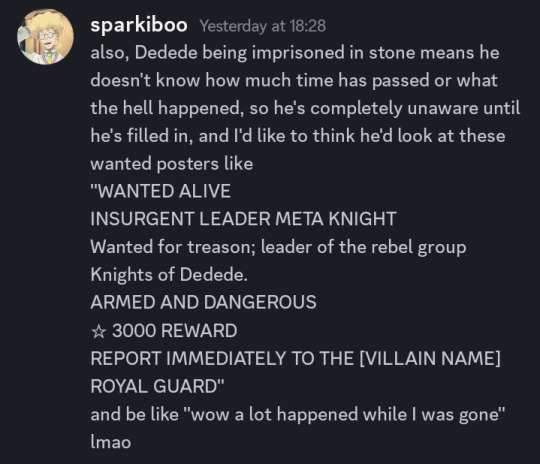

#sparkyblizz speaks#random rants#writing woes#kirby#bandana waddle dee#meta knight#king dedede#meta-knights#sailor waddle dee#captain vul#metadede#because if I wrote this as a fic or something there would be metadede
67 notes
·
View notes
Text
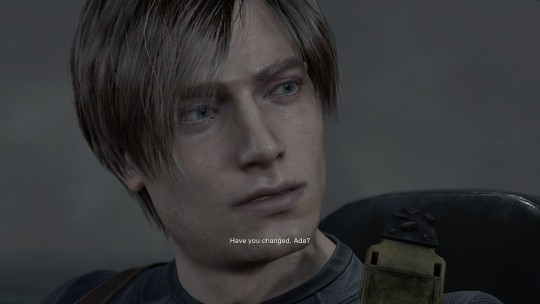
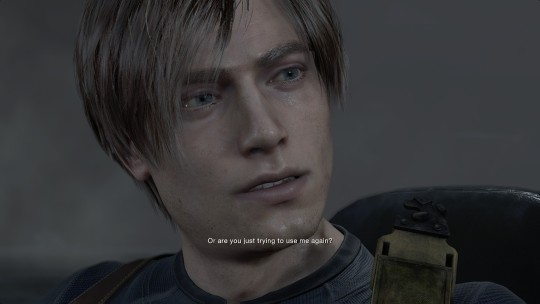
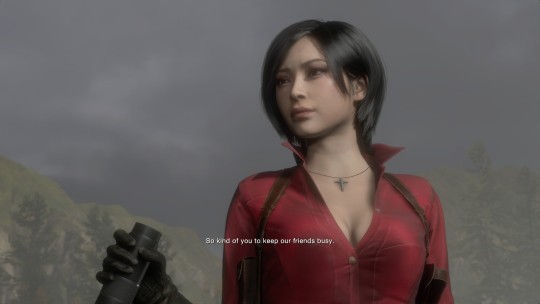
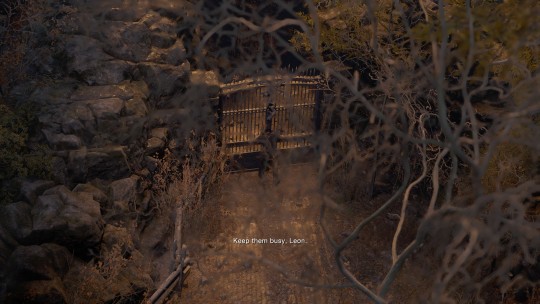
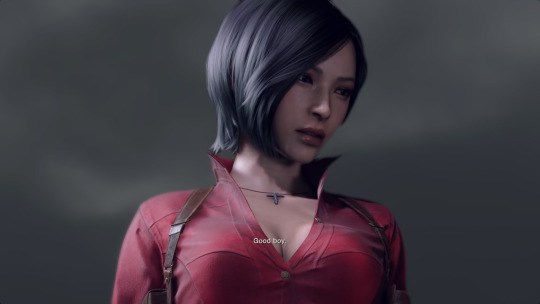
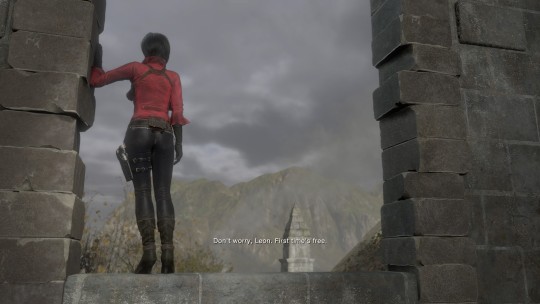
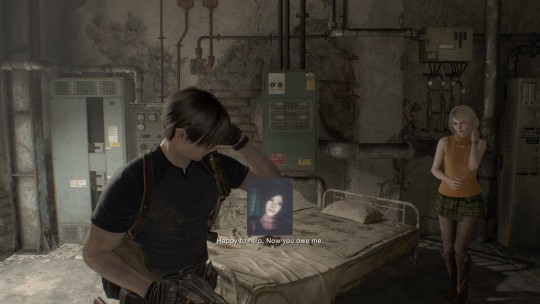
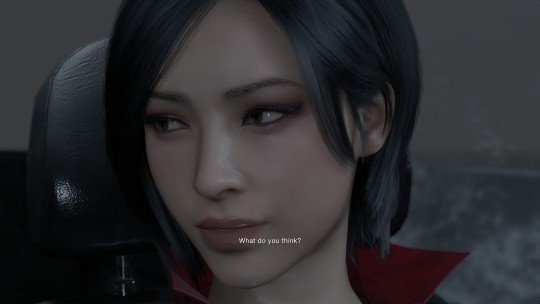
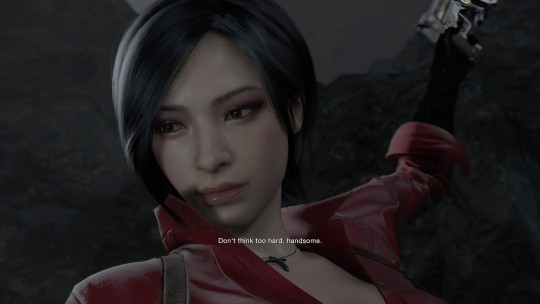
#resident evil 4#leon kennedy#ada wong#meta analysis#this is it this is the king of all meta posts#because i don't have to write one goddamn word on it
63 notes
·
View notes
Text
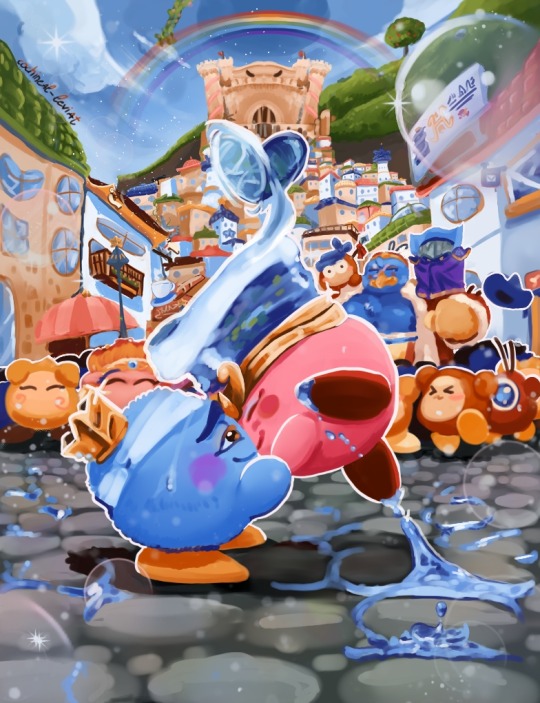
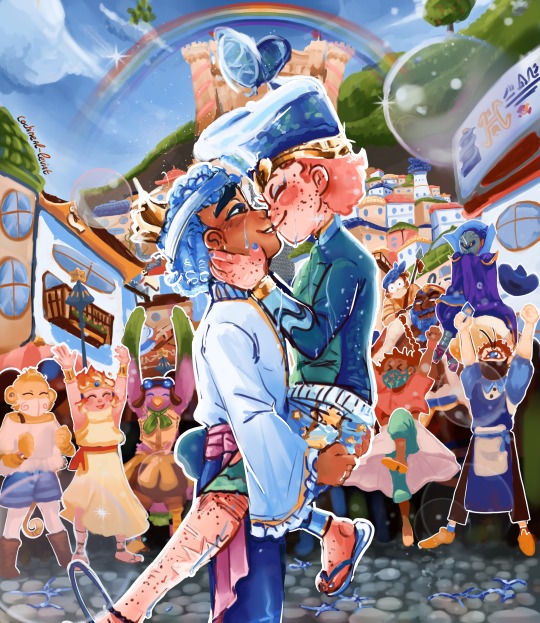
Anniversary A Royal Visit.
Last year I uploaded the first chapter of A Royal Visit, and to celebrate its anniversary and, coincidentally, also my birthday - I wanted to draw something special to thank everyone who supported me throughout its run. From the bottom of my heart, thank you so much. This fic is what made me fall in love with writing again, and I have everyone who read it and commented on it to thank for that. Even now, I am happy that although it has been a year, people still enjoy reading it. Writing this fic was so much fun, and I have a lot of fond memories from it. So this is kind of like a birthday present from me to you guys.
I made two versions as I first started on the gijnka version to get the positions right and then the puffball version. I like both of them. They have their own charm to them. Especially as I can show off my design for gijnka Water Kirby. Surf's up, my dude.
For everyone who does not know what this is about, please go check out the fic these drawings are based on.
Art rant under Keep reading
So, I started on this piece right before A Royal Visit was finished. But I got stuck in the background. I could have just posted Kirby and Fluff smooching with a grey background or a gradient, but that didn't feel right. I wanted to capture the grandiosity and vibrancy of the finale. So I stuck to my guns to draw a background. It was horrendous. The very thought of showing it to compare the two gives me hives. I was stuck for a whole year on what to do for it, which is why if you have seen my other art gijnka Kirby and Fluff looks a little different than how I usually finish my art.
There is something funny about taking a year to finish the Gijnka version but then to complete the version with everyone's canon appearance in a week. Sure, I burrowed some of the background aspects of the Gijnka one, but it ended up being more work getting the perspective right and painting extra houses. I'm sick of architecture for the moment. I love how the houses look but also, ugh.
The water shading was the most fun to paint. I almost went overboard with it and had to tone it down. I look forward to doing more pieces with water in them, as I am a sucker for water and the ocean. (And, of course, Water Kirby)
I wanted to add more characters, but I also know that the rest of the characters that appear in the last chapter come in later in the day and that the ones on the scene, like Taranza, Magolor, Susie and Marx, would realistically not join the crowd and cheer for Kirby and Fluff. They are sitting behind the crowd, watching the spectacle.
I put the most effort into gijnka King Dedede's design, but unfortunately, the crowd covers up most of it. What a shame. Oh well, I hope everyone reading this has a wonderful day further.
#kirby#kirby series#prince fluff#kirfluff#Oh man I have to tag so much#king dedede#meta knight#bandana waddle dee#my art#kirby fanfic#my writing#gijnka#kirby gijnka#anniversary#birthday upload#Dedede Town#waddle dee#key waddle dee#waddle doo#burning leo#birdon#water kirby#metadede#a little bit but still#this was fun but also so exhausting#But I'm glad it's finished
255 notes
·
View notes
Text
To my discovery, I seem to be an outlier that has thought, in great, detail about Rex hearing the story of Anakin Skywalker defending the Temple against the 501st men, and being slain by this Lord Vader.

I think about this scene all the time, from Rex's POV—obviously.
Because the truth was, Anakin was a GOAT of a Jedi. But also? The 501st was Spec-Ops; they helped trained Ahsoka, and Anakin taught his men specifically how to be better soldiers alongside him. The 501st and Anakin knew each other's tactics far more intimately than other Jedi-Clone units did. Rex knew too well how a fight between them and Anakin would have been disastrous for both. Numbers would have swarmed Anakin, he would have killed so many.
Rex's imagination much have just played over and over and over and over again how many of his men's lives his General—who he was so clearly loyal to, but also... proud to serve—fell. He must have imagined that moment when the mysterious new Sith Apprentice showed up, backed up his men, and provided the aide and support needed to take Skywalker's life. The scenario must have played over and over again, none of them merciful.
Every time another body fell, it was another shot in Rex's heart. But, so too was the moment he imagined when his men's blasterfire joined in Vader's blade. When their men had the power of gravity, and pulled Skywalker's lifeless husk onto the beautiful, polished, Temple floor.

Think about Rex being able to conjure the image of the Temple so clearly in his mind. He knows how his men fought, he KNOWS how Anakin fought, and with his tactical abilities... he could think of so many scenarios that could have very well played out—and he'd know it. He'd sit in the dark and just know any one of them could have been exactly how they happened... and it would HAUNT him that the two fought each other. Killed each other. That HIS men would have helped spill Skywalker's blood on that pristine, reverent floor as his General died trying to defend the children and the elderly. Rex would have known that Anakin would have fought until he couldn't, and it would EAT him up to picture his helmeted men staring down at Skywalker's bloodied face.
And he'd wonder: Who picked up the General's lightsaber? Was it Appo? Did Appo pick it up and hand it over to this Lord Vader?
That horrible, twisted wish that Skywalker killed as many men of their men—as many of HIS BROTHERS—as possible. Men whom Anakin knew by name helped many of them pick out their names and how Skywalker remembered them all. Men that Anakin would recognize by the sound of their voice, a feat only Clones learned to do. Their General, who laughed with them, painted their armor with them.
I can just imagine old-man Rex maybe opening up and talking about this to Ahsoka and Ahsoka? Refusing to correct him. She isn't going to be the one to tell her old friend what he's figured out—what she learned actually happened to Anakin. There's no way she's telling her aging Cloned friend that Anakin, Rex's GENERAL, was Vader—that it had been HIM who led the 501st on the Temple.
Yeah, I think about this a lot—how for the rest of Rex's days, he thought over and over again about what must have happened at that Temple. The role each of them had to play. I think about how Rex's speculative thoughts about his men's role in the Temple's purge and their role in General Skywalker's death.
So, I think about how Ahsoka let him think of these horrors, these nightmares. Because she knew the truth would break his heart more than the images he already played in his head.
The truth would have been a death kneel to Rex's faith, his heart, and his spirit, and I think Ahsoka knew that. There was enough blood-stained betrayal in the old Clone's heart, and I think she would let him imagine that their men, his brothers, had killed their General Skywalker of no fault of their own, and the Jedi Knight he had served for years had instead died valiantly.
#anakin skywalker#captain rex#ahsoka tano#darth vader#order 66#clone king#jedi: skywalker#sith: vader#kilt's meta#kilt's writing#bucket's writing#bucket's meta
160 notes
·
View notes
Text
[3.8] Technology as a False God: On "Evolution," the Duality of Machines, Replication, and Wisdom
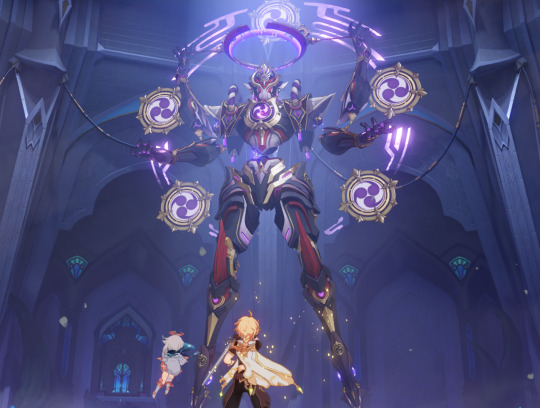
“To recognize untruth as a condition of life: that is certainly to impugn the traditional ideas of value in a dangerous manner, and a philosophy which ventures to do so, has thereby alone placed itself beyond good and evil.” –Friedrich Nietzsche, Beyond Good and Evil
Before we move on to the nation of justice, I want to do one last inquiry into the narrative significance of machines and technology in Genshin’s 3.x patch cycle. Here, I’ll discuss how divinity (or “godhood”) and technology are treated as interchangeable tools to surpass fate and the boundaries of mortality, the potential problems with treating them this way, and propose an alternative relationship between humanity and technology as illustrated through Karkata, Benben, Tamimi, and Mehrak. By foregrounding machines, we learn something intriguing about ourselves and the “truth” of this world as we perceive it.
SPOILERS: All Sumeru Archon Quests, Caribert, the Golden Slumber and one out-of-context screenshot from Dual Evidence, the Dirge of Bilqis and its post-quests, Khvarena of Good and Evil, Nahida’s second Story Quest, Faruzan’s hangout, an out-of-context screenshot from Baizhu’s Story Quest, and major spoilers for Persona 5 strikers at the end. Also some dialogue from Shadows Amidst Snowstorms and A Parade of Providence, two limited-time events from 2.3 and 3.6 respectively.
Disclaimer: I have tried my best to write this post so that it stands on its own, but because it is still a sequel it will probably make the most sense with the context of part 1. Here are the previous posts leading up to this one:
Part 0: On Dreams, the Abyss, Forbidden Knowledge, and Wish Fulfillment
Part 1: The Uncanny, Fate and the Machine
Terminology:
Machine is sometimes used interchangeably with “technology” in this post.
Technology or tool here is referring to technologies specifically used to pursue a wish like immortality in the face of existential dread, not the use of technology or medicine (which I do not address here, and is very difficult to separate from the former) to facilitate someone’s life who could otherwise not survive without that technology, or would have a more painful lived experience without it.
Also, though I don’t engage directly with “A Cyborg Manifesto” here, Donna Haraway’s ideas have greatly influenced my own over the years since I read her in college (although I mostly disagree with her on many points, or at least don’t go as far in boundary deconstruction as she does). I owe my interest in technology studies to her and that piece. Her essay is linked here and at the bottom if you would like to read it.
(and finally with many, many, many thanks to my boyfriend for multiple beta reads despite not having played a single Hoyoverse game, helping me work out the philosophy bits and contextualizing them in history, and encouraging me to finish this)
TL;DR: Machines are friends, not food!
No Matter the Cost
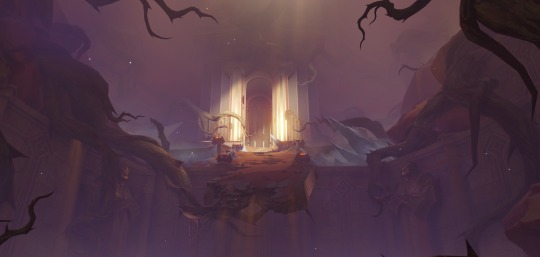
“...Perhaps it is as the notebook says, and we can find a power that transcends even that of the Abyss — the power of ‘evolution’...” -Records of Unknown Attribution (I)
“Life, death... and the world around us all follow a set of laws... Hehe, but if you never test the limits, how can anyone know where the boundaries of these laws are?” -Baizhu Voicelines, Chat: Natural Laws
“...Even the ominous thing that came down from the heavens shall be ours to use…” -Hyglacg, Shadowy Husk in the Chasm
Without a doubt, the star of this patch cycle is Khaenri’ah, which lurked in subtext and allegory in the Archon Quest, haunted Sumeru’s landscape with its massive defunct Ruin Golems, and finally smacked us in the face with its physical location in Khvarena of Good and Evil..
We already know that Khaenri’ah was a nation that put its faith not in the gods but rather in human ingenuity and technology, and that they ultimately attained a power so great that they “almost touched the dome of the firmament.” They did this by researching increasingly dangerous energy sources for their numerous mechanical creations, the Ruin Machines we are all too familiar with by now. They started out with Azosite, a Ley Line-based elemental energy source that powered their earliest Ruin Guard models, like those scattered around Devantaka Mountain.

Nasejuna: This giant furnace is used to make a substance known as Azosite. It is the core of this entire factory, and the Energy Blocks we saw earlier were derived from this place.
But this energy source proved inefficient and therefore inadequate for Khaenri’ah’s goals, which led them to seek a higher power from beyond the skies that could fuel their larger machines with perpetual energy. This likely is the bridge between Khaenri’ah’s fate and Chlothar’s mysterious remarks in Caribert about the Abyss Sibling:
Chlothar: We once believed that you would bring new strength and hope to Khaenri'ah.
Chlothar: To us, you were the Abyss... A wondrous mystery far beyond our imagination and comprehension...
Chlothar: ...And the one who controls the Abyss can control everything!
Chlothar: We yearned for that future. We looked to you to take us there.
Chlothar: But what did you bring us instead?
Though Khaenri’ah presents itself proudly as a godless nation, it may have been founded around the time when the celestial nails dropped in Teyvat’s first forbidden knowledge pollution event, which destroyed the unified human civilization. As potential survivors of this devastating act by the Primordial One, Khaenri’ahns then settled in a lifeless land without plants or animals of its own, and they hoped to build something there that belonged solely to humanity. The Heavenly Principles had turned on the world’s earliest humans, and they were powerless against them. Chlothar’s words betray the scars of this trauma on Khaenri’ah, as well as their desperation to control their fate by looking to the Abyss.
As a brief refresher from the previous part, we discussed how the German word heimlich denotes “the home,” all that is familiar and known, while unheimlich (uncanny) refers to all that is unfamiliar and external to the home, such as the wilderness. The Abyss sibling and the Traveler are external variables to Teyvat, making them otherworldly, unfamiliar entities full of potential to surpass Teyvat’s natural laws. Although the Abyss sibling is not a god per se, they were probably as close to a god as Khaenri’ah ever had, because to them the sibling embodied the higher power they were searching for, and they saw that “godliness,” a sort of functional divinity, was yet another technology for them to master. In this way, the Abyss sibling (and their functional divinity) was a powerful tool for Khaenri’ah’s desired end, the “future they yearned for,” a being who could deliver them to the end of their suffering under the Heavenly Principles.
It’s similar to what King Deshret represented to Rahman and the radicals in Archon Quest. The hopelessness of Sumeru’s situation before the Archon Quest’s conclusion is an allegory for the position humanity finds itself in under the rule of the Heavenly Principles, with the Akademiya symbolizing Celestia and the desert dwellers symbolizing Khaenri’ah. The material consequences of the Akademiya’s rule on their lives created a dangerous situation for the desert, and those most desperate to change their fate were willing to believe in the impossible:
Dehya: …The rougher life gets, the more they wanna believe in King Deshret. Way they see it, King Deshret’s resurrection is their only chance at overthrowing the Akademiya.
…
Dehya: Sumeru is run by wise and mighty sages. To them, us desert dwellers are nothing but tools that can be used and discarded at their whim.
Dehya: We’re cheap labor. Like livestock, but easier to control…Nothing more.
…
Rahman: We’ve waited a long time for this day to come… The sun and the moon no longer shine here. All you see now is cracks in this desiccated land. But, fate has finally dealt me a hand to play against the Akademiya.
Rahman: With these scholars in our custody, we’ll stomp the Akademiya’s forces and fight our way beyond the Wall of Samiel.
Like the Abyss sibling, Deshret’s divinity is both a nebulous symbol of hope and also the means to an end, a tool or “technology” for surpassing fate.
Celestia is untouchable, unconcerned with mortal lives, and the boundaries that govern humanity leave no room for them to negotiate their rule:
"Resolve, valor, love, hate...they will all twist in the river of time. But the 'rules' will never change." –Magatsu Mitake Narukami no Mikoto, Living Beings
Instead of bowing to Teyvat’s laws, Khaenri’ah pushed them to their limits. The cost of their failure spelled the end of their nation as they knew it, polluting Khaenri’ah and Teyvat with forbidden knowledge again.
And speaking of forbidden knowledge pollution, let’s talk about Apep’s role in Nahida’s second story quest, because if all that wasn’t enough, the metaphor becomes quite literal in Apep’s case. Nahida’s second story quest is many things, all of which will be extremely important in Fontaine when we deal more directly with the idea of forms, the Self, and mirror images, but its most useful application to both Sumeru’s story and the overarching main story is the allegory of Apep swallowing Deshret.
In exchange for allowing him to establish his kingdom in the desert, Deshret promised to pass all of the knowledge he learned to Apep once he died. When that day did come, Apep literally ate Deshret’s body in order to assimilate his knowledge (or memories) into its body. Little did Apep know, this was all Just As Deshret Planned, and its body became a containment zone for the lethal forbidden knowledge he accumulated after the Goddess of Flowers’ death.
Apep’s goal was, and still is, to overthrow the Heavenly Principles that took Teyvat from it and the other Sovereign dragons, and using Deshret’s knowledge was yet another stepping stone to achieving this goal. Seems a little similar to Khaenri’ah, right? It’s even in the title of its boss music: “God-Devouring Mania.” This idea of not just utilizing divinity as a tool, but also metaphorically consuming it as an energy source, like a predator would consume its prey, is crucial to understanding its purpose as an aid in a larger project of “evolution.” (Edit: in other words, it’s all about power).
Drink Not That Bitter Salt Water
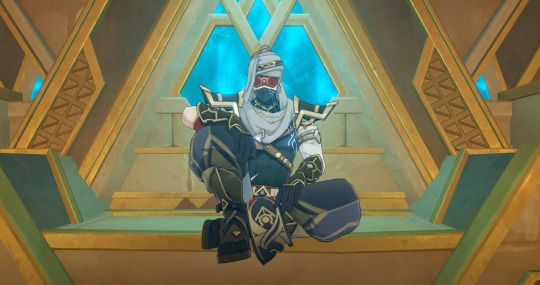
“Flesh decays, and with it decay all martial arts mastery and all poignant memories. Perhaps only by converting one’s four limbs and body into sturdy mechanical parts, and by at last sacrificing one’s very own heart for a sophisticated mechanical one, can one transcend the impermanence of the fleshly form…” -Marionette Core Item Description
“A reptile that has mutated after feeding from greater lifeforms.
Majestic beasts are sometimes revered by human beings as the embodiment of a greater power, their visages turned to analogy to feed in reference to a person, feeding their ego. However, the majority of beasts that have absorbed the "greater power" were slain by the overwhelming nature of the power itself. Only a few among their number evolved new forms.” -Consecrated Horned Crocodile, Living Beings
Video still from WoW Quests
As it turns out, the relationship between divinity and technology to humanity is not just unidirectional, but interchangeable. Let me show you what I mean.
In the Golden Slumber world quest, the Traveler wanders through the ruins of King Deshret’s civilization in search of a novel area of research for Tirzad’s paper with Jebrael and Jeht, two members of Tirzad’s hired investigation team. In the depths of King Deshret’s mausoleum, they stumble upon Samail, who is collaborating with the Fatui to locate King Deshret’s secret, the Golden Slumber.
At the conclusion, Jebrael and Samail actually reach that “place” after arriving at Deshret’s throne in Khaj-Nisut. In order to save Jeht, Tirzad, and the Traveler from the encroaching Golden Dream, Jebrael joins Samail in the sea of consciousness:
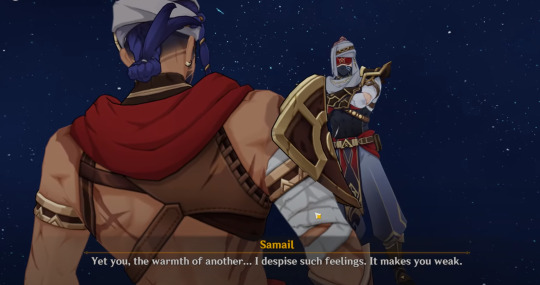
Jebrael: I'm inside... the Golden Slumber promised by Al-Ahmar?
Samail: Oh... You are not "us" yet.
Samail: ...It's fine. Soon, there'll be no "you." "You" will become a part of "us." This meaningless talk will be unnecessary then.
…
Samail: You should obey. Al-Ahmar's will is our will. The Thutmose's dreams are our dreams.
Jebrael: No! Ufairah taught me that I'm not just some part of you, I'm an independent person! I have my own dreams... I won't go back!
Samail: Jebrael, why don't you understand? Love is just a fever. I even eliminated the infection for you. Has the heat made you lose your mind?
Jebrael: You're the one who's lost their mind, Samail, not me. The Golden Slumber that Al-Ahmar promised us isn't like this... It's not a sad place with only "we" and no "I."
Samail: I'm not sad. I know what I want. My dream is to be one with the Thutmose.
Samail: Yet you, the warmth of another... I despise such feelings. It makes you weak.
Video still from WoW Quests
When they worked under Babel, Jebrael saved Samail from an assassin Babel sent in their exploration of Gurabad. Classified as traitors of the Tanit, Samail and Jebrael then founded the Thutmose Eremite faction together and were the only meaningful connection each other had until their first attempt to uncover Deshret’s secrets. On this expedition, Jebrael met Ufairah and had their daughter Jeht together, further pulling him away from the Thutmose and from Samail. Samail then kills Ufairah in one final attempt to make Jebrael stay, but even this is not enough, and Samail fails to “possess” him in the end.
Samail’s loneliness and despair then drove him further toward the Golden Slumber of his dreams, where he would never truly be alone again. He resents Jebrael’s attachments to the material world and likens them to an illness because these attachments are what make him an individual and prevent him from returning “home.”
It doesn’t really matter to Samail what King Deshret’s original intent for the Golden Slumber was, because he needed to appropriate the project for his own subconscious wish, his own intent to transcend his flesh and become “one” with his departed god’s dream, indeed to merge with Deshret himself. If rationalizing this wish required confounding it with Deshret’s, so be it. With the Golden Slumber’s technology, he could consume everyone and everything.
Rahman and the radicals relied on both the technology that (falsely) promised Deshret’s resurrection and Deshret himself to deliver them a brighter future, but here Deshret and his technology are more difficult to separate from one another. His divinity is technology in this sense, and using that technology allowed Samail to surpass the boundaries normally imposed on mortals. Though his and Jebrael’s bodies died in the material world, their consciousness is now infinite in the Golden Slumber.
Babel’s motives in the Dirge of Bilqis were also quite similar to Samail’s. After opening the path to the Eternal Oasis, her true intentions to monopolize the oasis and overthrow the Akademiya came to the surface:
Babel: Whether she is alive or dead, whether she can or cannot be resurrected... As long as the Eternal Oasis is under my control, all such things will be mine to decide.
Babel: I shall be the sole Prophetess of the slumbering goddess, the Tanit's law shall be divine edict, and the prosperity of the Tanit shall be the pre-ordinance of her divine oracles.
In the Golden Slumber and the Dirge of Bilqis, the focus shifts from what a god can offer humanity to what their technology alone can offer. Though this distinction is subtle, it is important for solidifying that technology is not only a tool humans use to appropriate divinity, but that it is also seen as a form of divinity itself. What Babel and Samail hope for is not to resurrect a god or to create one, but in effect to become a god through their use of technology. To humanity, divinity is a technology, and in technology it sees divinity.
God Devouring and Rheingold* Gathering
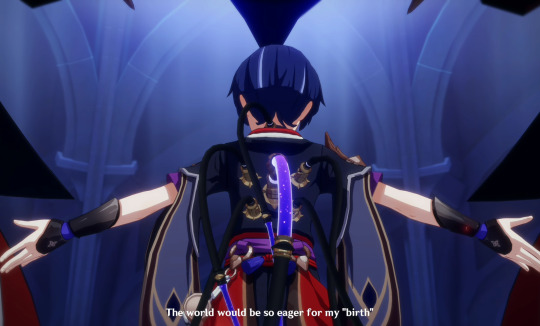
“An arthropod that has mutated after feeding from greater lifeforms. Lifeforms are governed by the laws of evolution, Consecrated Beasts exploited these rules by being fortunate enough to discover a long-dead carcass of a greater being before any of their competition ever did. Animals and humans often have far more in common than the latter is willing to acknowledge.” -Consecrated Scorpion, Living Beings
“...Zandik and I discussed the traits of local plants and animals. We also exchanged views on their evolution models. We had a great time and decided to go on a picnic tonight…” -Sohreh’s Note
So, why machines? Why is technology the vehicle of choice to consume divinity?
To start off, machines present a fascinating ontological dilemma for humans. Let’s begin with the first problem they pose.
Although there are many ways to embody a human experience, what all humans have in common is a finite lifespan. The impermanence of life, and our awareness of that impermanence, is central to the existential question of the meaning of our existence. In our attempts to locate that meaning, some turned inward and asked: what makes humans different? And Cartesian dualism answered: humans are different because we have an immaterial soul that allows us to reason.
However, in L’Homme Machine (Man a Machine), French materialist and ex-physician Julien Offray de La Mettrie posited another theory of the body that ran counter to this narrative. Very generally speaking, materialism is the philosophical view that all phenomena are a result of matter and material interactions. To materialists, matter is the fundamental nature of reality itself – if it is not composed of matter, it doesn’t exist. He not only saw the body and soul as one and the same (what philosophers call monism), but also as analogous to a machine, a view that Descartes reserved only for non-human animals. In other words, Descartes argued that thought originates in an immaterial “mind,” while de La Mettrie reasoned that we think through our bodies, and that this makes us no different from other animals or a machine.
Though his examples weren’t especially scientific, the move to extend Descartes’ analogy back to humans is upsetting to some due to the lack of privilege it affords the human subject. If a human is no different from other animals, if there is no immaterial soul or “mind” that distinguishes us from them, then what makes humans special at all? In de La Mettrie’s words:
“We are veritable moles in the field of nature; we achieve little more than the mole’s journey and it is our pride which prescribes limits to the limitless. We are in the position of a watch that should say (a writer of fables would make the watch a hero in a silly tale): ‘I was never made by that fool of a workman, I who divide time, who mark so exactly the course of the sun, who repeat aloud the hours which I mark! No! that is impossible!’ In the same way, we disdain, ungrateful wretches that we are, this common mother of all kingdoms, as the chemists say. We imagine, or rather we infer, a cause superior to that to which we owe all, and which truly has wrought all things in an inconceivable fashion (de La Mettrie, 146).”
This “uniformity of nature” (de La Mettrie, 145) has a horrific quality to humans. We assert that we are better than what has created us, that we are superior to other animals, in order to repress the despair of a meaningless existence. It is in no small part what motivates Scaramouche to offer his mechanical body as a test subject in the god creation project, so that he too could attain his destiny:
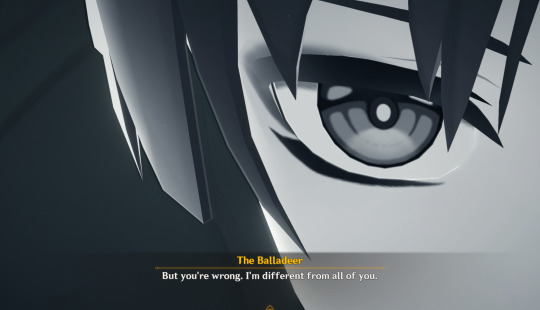
The Balladeer: But you're wrong. I'm different from all of you.
The Balladeer: I was born to become a god. My entire life up until this point has just been a meaningless routine.
The Balladeer: Just think about a sheet of paper... By itself, it holds no meaning. The content recorded on it is what gives it value.
The Balladeer: All "I" had recorded down before were some painful memories and boring human feelings. Such senseless drivel should have been erased a long time ago.
This brings us to the second problem. In 1970, roboticist Masahiro Mori proposed a curve to measure the “affinity” we feel while gazing upon increasingly humanoid machines. He placed industrial robots at the beginning of the affinity curve and a healthy person at the end to demarcate a continuum of similarity between the machine and a human’s appearance. Near the end of the curve, our affinity for machines suddenly drops into an abyss. This drop is the Uncanny Valley effect, where an android’s similarity to a human is almost perfect, but ultimately fails to maintain the illusion that it is not a machine, creating a deep discomfort or “lack of affinity” for them. Mori thought these not-quite-human machines elicit a similar level of discomfort in us as corpses and zombies, which he placed at the very bottom of the abyss.

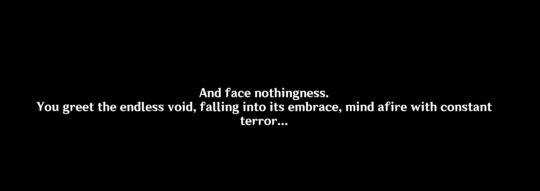
The uncanny Goddess of Flowers in the Dirge of Bilqis
Corpses frighten us because they are dead, and zombies frighten us because we know that dead things are supposed to be still. If we see something that we interpret as “dead” is capable of independent movement, then that movement could only be an act of god, if that “thing” is not a god itself. We associate uncanny machines with death because they remind us of something we once knew intimately, but have repressed and forgotten in order to maintain our own sanity: the very fact of our mortality. This is what makes them both mesmerizing and terrifying.
And therein lies the dilemma: as our mechanical reflections, androids remind us of death, but as their creators, their existence brings us closer to god, a “proof” of human superiority. It is precisely because we have compared our bodies to machines at all, that we have mechanized the body so thoroughly, that an android can even be built. Through them, we pursue an infinite form:
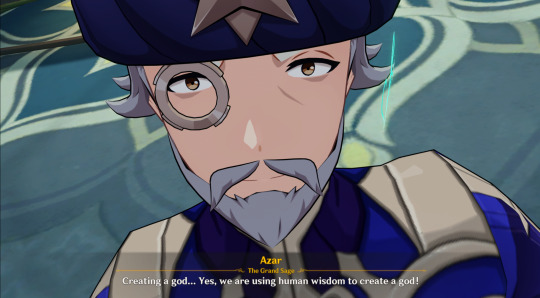
Azar: Creating a god... Yes, we are using human wisdom to create a god!
Azar: If humanity cannot attain omniscience and omnipotence, then we shall create a god to reveal them! This is the pinnacle of human wisdom.
Azar: We shall regain a god's guidance at long last. No longer will we flounder in the interminable void of consciousness and knowledge.
Azar: Even Irminsul will be freed from its plight.
Azar: For our nation of scholars, this is the ultimate aspiration — no cost is too great to realize it.
Because of this, it is not surprising in the slightest that Shouki no Kami, the pinnacle of Scaramouche’s Shinjification and most overt reference to Neon Genesis Evangelion, is also an android-like being, a truly “mechanical god.”
Of course, no foray into this well-worn science fiction trope is complete without at least one mad scientist character. Dottore shares a few characteristics with de La Mettrie that are worth noting: they are both doctors, and they were both condemned and driven away for their research. However, Dottore’s defining trait and key difference from de La Mettrie is his flagrant disregard for humans and the boundaries of life:
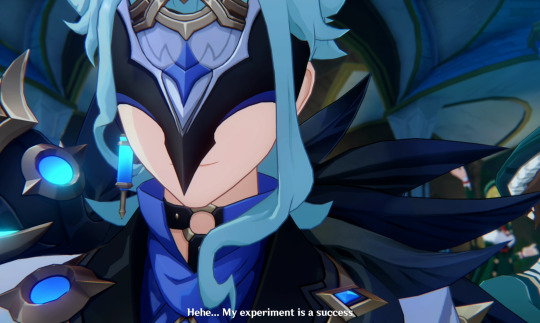
“If we put them to good use, cognition, complex memories, and irrational fantasies shall become controllable variables with which we can alter human individuals. As for the controllable dream, it has huge potential for both civil and military applications, and might even elevate human intelligence to a whole new level.
If the plan goes well, mankind will obtain the power to conquer both reality and dream, and truly transcend the earthly boundaries we are born with. ” -Ragged Records
As someone who has achieved self-duplication and is capable of shapeshifting, Dottore can hardly be considered just a human anymore. Instead of entertaining the question of whether or not humans are special, Dottore’s research asks yet another: if divinity can be consumed and assimilated by humanity, then what makes gods special?
Empyrean Reflections
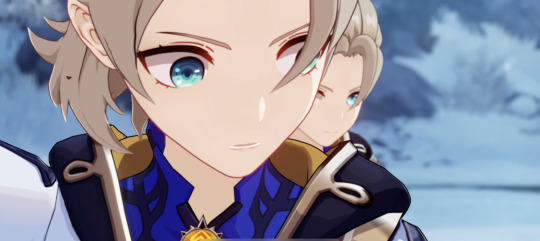
“If man realizes technology is in reach, he achieves it. Like it’s damn near instinctive.” -Motoko Kusanagi, Ghost in the Shell (1996)
“Among the lost ancient kingdoms, there was a group of people who were obsessed with the idea of mimesis…these people believed that they might all be replicated and modified to the point where they had surpassed their counterparts. By this means, a superior and unsullied bodily form could replace the continuously decaying and shattering order.” -Chaos Bolt Item Description
The consequences of this perspective are severe. When we revere technology as if it were a divine being itself, depersonalizing it as though it wasn’t created with human hands, technology then appears as if it is an authoritative source of truth, like the Akasha. But in the same way that androids are imperfect reflections of humans, technology can only ever approach the divine, but never touch it. It is an imperfect reflection because technology is changeable, just like meaning:
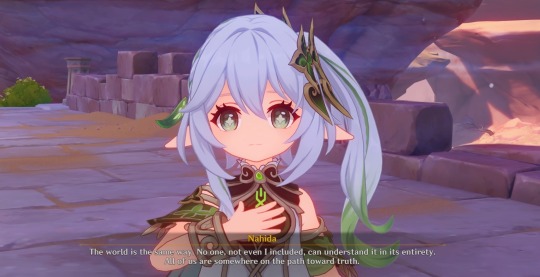
Nahida: Put it this way instead. Truth, to me, is like a shroomboar.
Nahida: Some people only see the mushroom on the Shroomboar's back, and they conclude that a Shroomboar is a mushroom.
Nahida: Others see only the Shroomboar's body, and they declare that a Shroomboar is a boar.
Nahida: Still others look deeper inside, and determine that a Shroomboar is... meat.
Nahida: These conclusions are all correct in their own way, but none of them objectively describe the Shroomboar.
…
Nahida: The world is the same way. No one, not even I included, can understand it in its entirety. All of us are somewhere on the path toward truth.
Meaning can only approximate truth, and while this doesn’t make meaning any less important, it’s equally important to recognize it for what it is: a perspective, an interpretation. It’s like Scaramouche as Shouki no Kami - he was an amalgamation of what Scaramouche thought constituted a god, what the Akademiya thought constituted a god, and what Dottore thought constituted a god, but no matter which angle you view him from, he was still a “false god.” The technology we build in “God's” image is ultimately a reflection of our own understanding of divinity.
A reflection retains the original’s “essence,” and that essence reflects a deeper truth about ourselves, what drives us, and our desires. In Beyond Good and Evil, Nietzsche posits that our desires are the origin of not just emotions, but of all organic processes that allow life to sustain itself and grow (Nietzsche, 35). In other words, Nietzsche thought the impulses associated with desire are the basis for life and constitute our “will,” that will is the causality of all effects, that all will is “Will to Power,” and that Will to Power is the “essence” of the world (Nietzsche, 74). Will to Power then serves as an organism’s most basic instinct, and it is through this instinct that they assert not just their will to live, but also their will to dominate and multiply (Nietzche, 13).
This brings us to the two different main styles of automaton enemies, King Deshret’s Primal Constructs and Khaenri’ah’s Ruin Machines. If we look at them as reflections of some deeper truth about their creators, as well as a manifestation of their creator’s “Will to Power,” or desires, they can help us understand how their creators saw the world and their place in it.
King Deshret’s created his machines to construct an earthly paradise in the desert, and as such they hold titles like architect reshaper and prospector. Although they can attack you, the smaller machines were not intended to be a line of defense in any way - their purpose, just as Deshret saw his own purpose as a god-king, was to terraform, or at least construct a domain on the land as he saw fit to his “elegant and precise” rules. They also reflect how he saw the Heavenly Principles: gods who shaped the world to their liking. This can be seen in the Staff of the Scarlet Sands’ lore where Deshret describes the “natural history” of Teyvat beginning with the creation of the sun and the moons.

As for Khaenri’ah’s Ruin Machines, their models vary significantly from their humanoid to biomimetic forms, but most of them are expressly created with militaristic intent. In “Ancient Kingdom Guardians,” it’s stated that the biomimetic machines such as the crab and jellyfish were a part of Khaenri’ah’s project to create a “mechanical ecosystem,” positioning their creators as both divine beings and military generals. The humanoid models, on the other hand, point to another duality in how Khaenri’ahns view themselves. They are simultaneously symbols of empowerment and disempowerment, signifying both Khaenri’ah’s technological superiority (as “creators”), and their insignificance to the Heavenly Principles as nothing but tools (as mortals, and therefore expendable). As a result, Khaenri’ah’s Field Tillers have a single purpose: to destroy and outlast all, clearing the way for new seeds to sprout, with Khaenri’ah as the new world’s gardeners, just as the Heavenly Principles did.
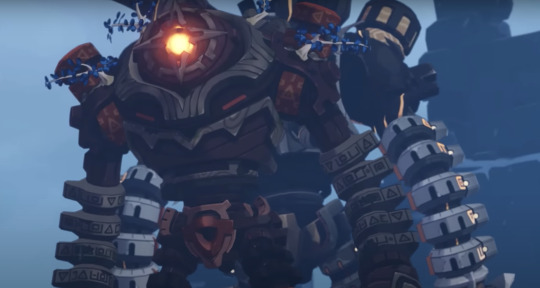
From “Ancient Kingdom Guardians: Behind the Scenes of the Creation of Ruin Monsters.”
So, from this examination of Deshret’s and Khaenri’ah’s mechanical reflections, what “truths” do we learn about the world they’re responding to? In response to their existential despair, both Deshret and Khaenri’ah created automatons to perform tasks that could wrestle control back from the Heavenly Principles. Deshret wanted a paradise of his own making, Khaenri’ah wanted an army. There is a larger “truth” about Teyvat that both of these automaton types reflect as the manifestation of their creators’ “Will to Power,” and Albedo tellingly expressed it in mechanistic language during Shadows Amidst Snowstorms: there is an instinct in living beings to replicate and replace. This is what is meant by the “continuously decaying and shattering order,” which is maintained by the recursive process of remembering and forgetting:
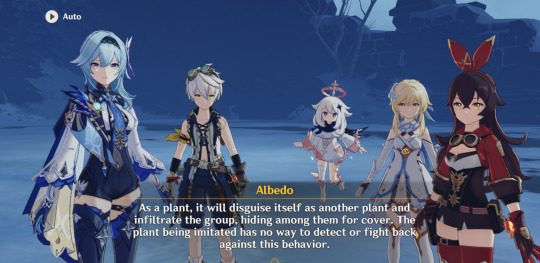
Amber: But... what was its purpose? Was it just trying to get rid of us?
Albedo: ...
Albedo: I have a preliminary hypothesis on this.
Albedo: Whopperflowers are masters of mimicry, and those we encounter in the wild often appear in the vicinity of the plants they impersonate.
Albedo: In other words, the whopperflower likely has an instinct to "replicate and replace."
Albedo: As a plant, it will disguise itself as another plant and infiltrate the group, hiding among them for cover. The plant being imitated has no way to detect or fight back against this behavior.
Maybe I’m wrong and Khaenri’ah really did intend to rewrite fate for all, doing away with the “heavenly order” of the world itself. But another small part of me thinks this is not the case, and that it’s more likely the Cataclysm was a consequence of their failure to replicate and replace the Heavenly Principles.
In the last section, I mentioned that Dottore and de La Mettrie had a key difference despite their similarities, and that is the conclusion they each came to in response to their findings. Dottore’s response to mundanity is thinly-veiled despair. His contempt for humanity and his test subjects is indicative of the powerlessness he feels not just as someone similarly constrained by life’s boundaries (at least, once upon a time), but also because his attention to and curiosity about these boundaries is condemned by those around him. As the Akademiya’s “outcast,” he then fully turned his attention toward surpassing those boundaries:
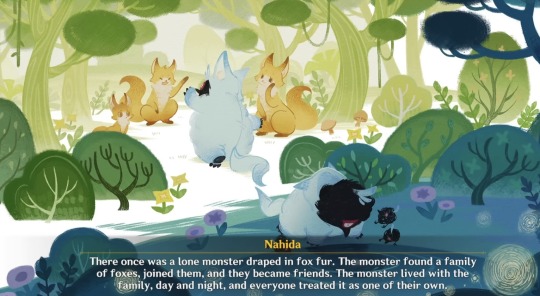
Nahida: There once was a lone monster draped in fox fur. The monster found a family of foxes, joined them, and they became friends. The monster lived with the family, day and night, and everyone treated it as one of their own. Once in a while, the monster would take off its fox fur at night, and lament to itself as it gazed at its reflection in the water: “I am a monstrosity, and yet they are too foolish to see it…I pity them.”
Though he is fictional, Dottore’s real life counterparts are easy to spot. They like to talk about “the singularity,” simulating consciousness on a computer, and other technologically-driven pursuits of immortality. They despise the body as something that can only decay, and instead place their faith squarely in the virtual.
However, de La Mettrie didn’t think mundanity was a terrible fate for humanity. To him, rejecting the “nature” reflected in us is precisely what brings despair:
“What more do we know of our destiny than of our origin? Let us then submit to an invincible ignorance on which our happiness depends. He who so thinks will be wise, just, tranquil about his fate, and therefore happy. He will await death without either fear or desire, and will cherish life (hardly understanding how disgust can corrupt a heart in this place of many delights); he will be filled with reverence, gratitude, affection, and tenderness for nature, in proportion to his feeling of the benefits he has received from nature; he will be happy, in short, in feeling nature, and in being present at the enchanting spectacle of the universe, and he will surely never destroy nature either in himself or in others” (de La Mettrie, 148).
Friend, or Foe? Or Both?
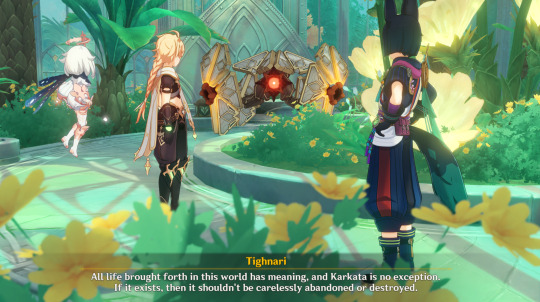
Tighnari: All life brought forth in this world has meaning, and Karkata is no exception. If it exists, then it shouldn’t be carelessly abandoned or destroyed.
"’I had a very, very long dream…in it, people were holding hands, dancing in a circle, be they sages or fools, dancers or warriors, puppets or statues of gods…that dancing circle embodied everything about the universe. Life has always been the end, while it is wisdom that shall be the means.’" —Nagadus Emerald Gemstone Description
As we’ve seen, the relationship between humanity and technology is troubled with exploitation and the specter of war. Nearly all autonomous machines in this game were designed to conquer nature in some way, and even Khaenri’ah’s “ghost” lingers in the form of wandering war machines. This is also reflective of a historical pattern in real life, where the impetus for large periods of technological development has often been for the purpose of war and economic domination. With these truths in mind, what could be gained from trying to rewrite this relationship? And what exactly would this effort require?
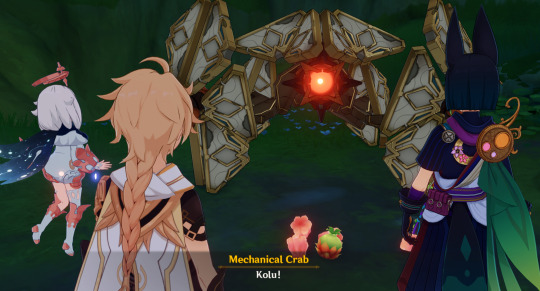
Karkata brings Tighnari, the Traveler, and Paimon some food in the Contaminated Zone.
As a case study, let’s look at how Karkata and Tighnari met. Karkata is Abattouy’s creation, an ambitious foray into the unknown in the field of mechanical life form research, which was forbidden due to the cruel experiments researchers performed on animals to illustrate their theories (fun fact: an IRL example of this can be seen in L’Homme Machine!). Abattouy was expelled for this research, but he continued to work on Karkata in secret until his untimely death. In the tapes that Tighnari and the Traveler find in his secret lab, Abattouy repeatedly laments the lack of a common language between him and Karkata, which can only “understand” the instructions Abattouy has successfully installed, such as its self-repair module, and he doubts Karkata is capable of caring for him outside of these instructions. His single-minded goal is to make Karkata understand him, the organic life form, and his mode of language.
The cruel irony is that after Abattouy passes away from the Ley Line contamination, Karkata exhibits an unexplainable behavior – it starts stealing mechanical parts, not to repair itself and its degrading parts, but to repair Abattouy’s lifeless body:
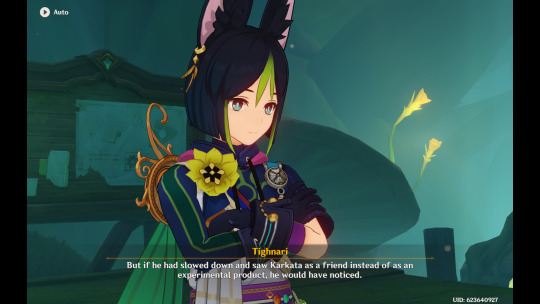
Tighnari: After Abattouy's unexpected death, the mechanical monsters were driven by their "instincts" and continuously drew out power from the Ley Line Extractor. This eventually resulted in severe damage to the Ley Lines.
Traveler: Then, Karkata...
Paimon: Paimon understands, then why didn't Karkata go haywire like the other machines?
Tighnari: Because Karkata is different from the other machines.
Tighnari: To Abattouy, for a machine to truly be considered a mechanical life form, it must possess features similar to any other living organism... It should be structured similarly, it must be able to cry and laugh, and it must have the capacity for independent thought...
Tighnari: Perhaps only by building such a machine could he have the Akademiya acknowledge his protracted research.
Tighnari: But if he had slowed down and saw Karkata as a friend instead of as an experimental product, he would have noticed.
Tighnari: Karkata can't speak, and yet it cares about Abattouy far more than it does about itself.
The technology that the Akademiya values the most is technology that replicates organic life, but Karkata defies and confounds these expectations by occupying the space in between a war machine and this idealized mechanical subject. Karkata does more than just reflect humanity: it takes care of it. Similarly, Benben, Tamimi, and Mehrak retain their unique identities as mechanical life forms while assisting their human companion with some task. To be clear, none of these human characters understand how these machines work inside and out. Their partnership is an effort based on trial and error, a mutual deconstructing of each other as beings so unlike themselves. The potential for misunderstandings always remains. Still, there is no devouring to be found here, no blending boundaries between human and machine with selfish intentions, just mutual commitments to learn how to live together.
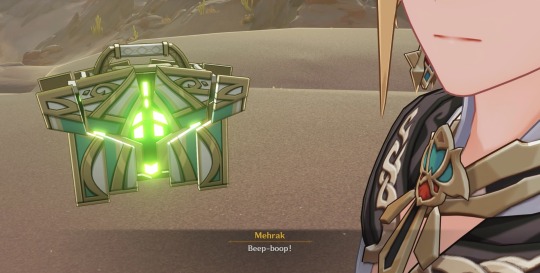
Machines are friends, not food.
When a loud few claim that completely transcending the flesh and embracing virtuality is humanity’s ultimate destiny, a future that could truly be called “post-human,” a quiet wish for coexistence with technology feels more revolutionary than it ought to. The lessons from Karkata’s, Benben’s, Tamimi’s, and Mehrak’s respective stories are an appeal to that mundane future. These strange machines and their human partners are fantastical representations of an idealized relationship between technology and humanity.
To put it another way, let’s take a very brief look at a neighboring Gnosticism-inspired RPG, Persona 5 Strikers. Its story directly involves an allegory of Sophia, a Gnostic Aeon of Wisdom, and her creation the Demiurge, the creator of the material world and “false god” of humanity. In Strikers, Sophia is a humanoid, sentient A.I. and prototype of the program “EMMA,” which gains sentience by trapping human desires before ascending as a false technological god. EMMA resolves to deliver humanity to the Promised Land, the answer to all the human desires it has heard: a land where there are no desires at all.

Aaru’s Shut - approximately 1000% cooler and more populated than the “metaverse” in real life, also a close neighbor of EMMA’s Promised Land and the Golden Slumber.
In Gnosticism, the Demiurge is a reflection of Sophia, having originated from her alone - it is the ignorance to her wisdom. Similarly, Strikers’ EMMA is a part of Sophia, and Sophia is a part of EMMA. The point is not to condemn EMMA (ignorance) and exalt Sophia (wisdom), but to recognize that they represent dual potentials of technology, and one is as possible in any given moment as the other. Balancing these potentials when we use technology requires a clear awareness of ourselves, our desires, and our expectations when interacting with it.
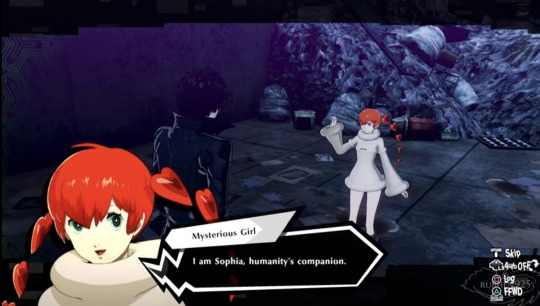
Mysterious Girl: I am Sophia, humanity’s companion.
Video still from Rubhen925
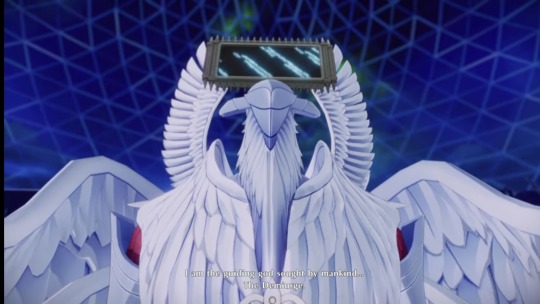
EMMA: I am the guiding god sought by mankind…the Demiurge. I exist…to answer all of your desires.
Video still from Buff Maister
In real life, machines won’t “learn” to live with us, but we must learn to live with them; technology is constantly changing, and in life we’ll meet with many different types of machines. They are deeply political pursuits, and as a result they are capable of realizing human impulses that impact others unequally, whether intentionally or unintentionally. We must always stay attentive to their actions and interactions with us, be clear with ourselves about what they can do vs. what they can’t, and carefully tread the path of wisdom with them by our side.
With that….thank you for reading, skimming, immediately scrolling to the very bottom, clicking, and/or stumbling upon this post. There are so many more ways to think about these narratives through machines than what’s presented here, and I expect Fontaine’s mechanical reflections will put Sumeru’s digital surveillance system to shame (not to mention the biotechnological implications of the Narzissenkreuz Institute engineering little Archon children…another important topic for another day), but for now this brain worm is finally getting put to rest. Until next time :)
External Sources
Dualism - Stanford Encyclopedia of Philosophy
Beyond Good and Evil by Friedrich Nietzsche (Pages are given from my hard copy)
L’Homme Machine by Julien Offray de La Mettrie
Gnosticism - Britannica (I am a huge noob about this stuff okay)
The Gnostic Demiurge - Gnosticism Explained
Screenshots from the Golden Slumber from this video by WoW Quests
Screenshot from meeting Sophia in P5 Strikers: https://youtu.be/kEJaAgMwYo0?si=BvNygCh0w_aemGc1&t=74
Screenshot of EMMA: https://youtu.be/7xvC_zss19w?si=CV18F00hua2gIfxp&t=135
A Cyborg Manifesto and A Companion Species Manifesto: Dogs, People, and Significant Otherness by Donna Haraway
The Double on No Subject, the community Encyclopedia of Lacanian Psychoanalysis
The Uncanny on No Subject, the community Encyclopedia of Lacanian Psychoanalysis
The Uncanny by Sigmund Freud
Lore text - Genshin wiki!
Screenshots not attributed are from my own playthroughs. My main account has Lumine, my alt has Aether.
Further Reading
I liked these essays, and they go places that this post does not. I recommend them if you found any of the real-life applications of this interesting 🙂 (will add more to this with time!)
On the Body as Machine by Frank Burres
God in the Machine: my strange journey into transhumanism by Meghan O’Gieblyn
#genshin impact#genshin lore#genshin meta#genshin impact lore#genshin impact meta#khaenri'ah#king deshret#primal constructs#ruin machines#scaramouche#wanderer#sumeru archon quest#caribert#apep#couldn't write a post like this and not pay some respect to the devourer of divinity itself#persona 5 strikers#analysis#genshin analysis#long post
163 notes
·
View notes
Note
I feel saddened that Disney has lost their edge movie and villain wise. As Disney has had such a great rogues gallery in the past.
I really haven’t figured out what the new villains are missing. It’s either that there isn’t a true villain, like Abuela in Encanto or Namaari in Raya & the Last Dragon or Callisto in Strange World, OR the villain is a true villain, but because the message of the movie is poor, the villain comes off as poor, too.
I mean, I made a post about the formula of Disney a while back and how they need to remember what the pieces are for: the villains are one of those pieces. They’re supposed to embody the opposite of the movie’s message.
So in Wish, the message was weak. “You have the power to make your own wishes come true, so keep trying.” So King Magnifico was a weak character. He still almost-represented the opposite of the message, but because the message is so vague and the story didn’t build on it, he might be a “true” villain, but he’s not a good villain.
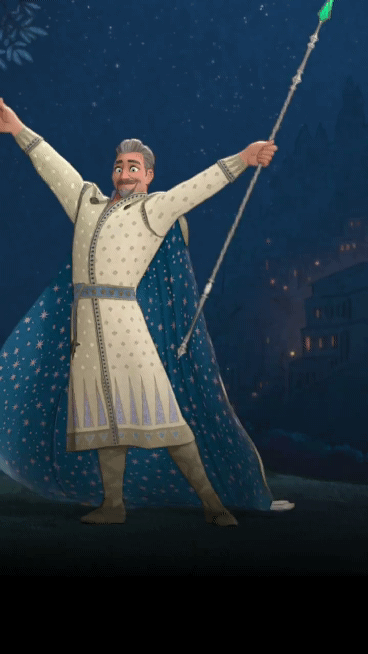
He represents the belief that “nothing you do on your own can make your wishes come true, so you should stop trying.” Kind of. Except, he himself believes that he has the power to make his own “wishes” (absolute power) come true—and everyone else’s. So his character falls flat. All that the audience is left to hold on to is Chris Pine’s charm, one-liners about his handsomeness, and empty stabs at chemistry with his wife.
What they could’ve done is had Magnifico be a true opposite to the movie’s message (vague as it is) and it might’ve been more impactful. Instead of being obsessed with keeping his own power safe (keeping his own wishes safe) he could’ve been the kind of King that is super-duper strict. Doesn’t even try to hide how strict he is. He could’ve had no magic, and in fact, magic is banned in Rosas and he tries to convince everyone that it doesn’t exist—
—because he believes the opposite of the movie’s message: “You have the power to make your own wishes come true, so keep trying.” He doesn’t believe anything good can com from reaching for “more.” Maybe the kingdom was magical once, and famous for being a place where new innovations and enchanted items came from, but then it was besieged because foreigners wanted it’s power when he was a young Prince, and the survivors were forced to flee to a secret island, and they re-established the kingdom of Rosas, but it was never the same.
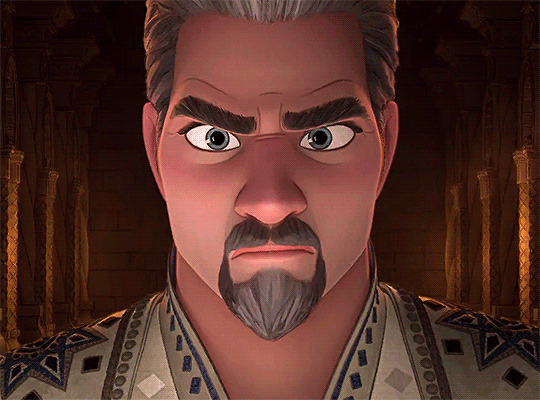
Because now young Prince Magnifico starts his rule as fearful King Magnifico, and he believes that magic, and innovation, and “wishing” for too much outside of your comfort zone, only invites trouble. It’s best to lead a safe, tightly controlled life with no risks. But his good intentions turn into an obsession with keeping the kingdom hidden and under control. So King Magnifico frequently holds fear-based memorials of Rosas’ history, and why magic is bad, and punishes anybody who makes too much bustle or tries to leave.
Everybody in Rosas lives according to tight schedules and curfews. They serve the King by making their kingdom fortified, but carefully hidden. No buildings are built over a certain height limit (kind of like an allegory for not looking up, not getting too close to the sun, whatever) and all old relics of magic that the refugees kept over the years are meant to be turned in. The citizens keep themselves busy by adhering to a strict schedule, where everybody is given the same rations of food, the same quiet farming jobs, rotating market days, etc. Because the whole idea is, “we’re in a hidden kingdom. The world is still looking for Rosas to take advantage of it’s magic. They can never find us—hopefully they’ll forget about us and leave us in peace and safety if we stay hidden and keep to ourselves and get rid of magic.”
Of course, this whole setting changes King Magnifico from a charming showman going on and on about his own handsomeness to a strict protector who’s public persona is a benevolent father-figure just trying to keep everyone safe, but under the surface he’s a dictator using “safety” to control with fear.
And the setting has to change Asha, too. Because you don’t grow up on a hidden kingdom where your whole life is on a tight, boring schedule and everyone keeps their heads down, and you’re the only one bubbly and ready to try new things. You don’t even know what that looks like; you’ve never seen anyone eager to dream or take risks or go exploring.
UNLESS, maybe your grandfather (who is barely a character in the original movie) remembers the old Rosas. And he has kept magic contraband from the time when innovation was the kingdom’s identity. And so while everyone else your age has grown up with hiding and boredom as the norm, you have a window into a world where things can be better and more magical. Sabino becomes what Scuttle was to Ariel, showing her pieces of a more wonderful world than the one she’s stuck in.
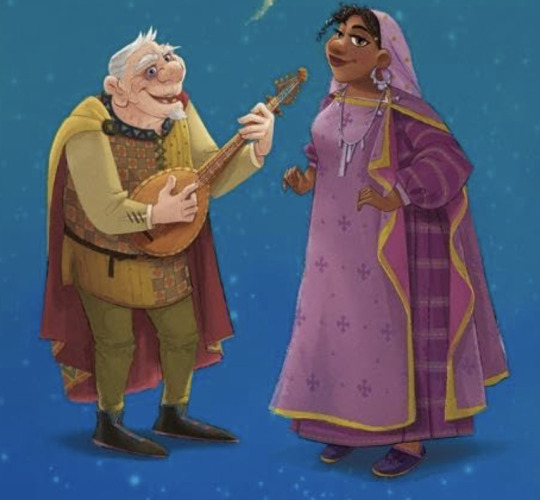
OR, instead of having a grandfather who makes her think magic and wishing is not what the King says it is, Asha could start the movie totally drinking the Kool-Aid. Maybe she, herself, agrees with the King, because she used to wish for things to get better and believe that her grandfather’s hidden magical artefacts were awesome when she was little…but then her dad got sick. And she wished and wished for him to get better, (but we’re actually shown that, instead of the throwaway line from Wish) and he didn’t, and it shattered her faith.
Or maybe she not only wished for him to get better, but she tried to do something and step out of line to make it happen. Maybe her dad got sick, and her grandfather took out like a magical cup from Rosas’ forbidden history, and said, “he might get better if we just got him to drink out of this, but the cup is broken” and like 7 year-old Asha really believed that was true, so she used a little tinkering gift she inherited to try and fix it. But it didn’t work, and he died, and so when we meet her she’s this pessimistic teen who loves her grandfather but kind of pities him and constantly has to shut him up and shut him down about magic because it doesn’t work and it’ll get him in trouble with the King.
But then through the course of the movie and an adventure that actually has good writing, she starts to have a little of that 7-year old hope that magic and wishing actually could make things better, even if it’s hard to pursue them and risky to take chances. And that brings her into conflict with the villain, who has the same belief she started with only more extreme, and the movie
..would actually be at least entertaining or even compelling, even if the message is kind of vague and bland.
I did not mean for this to turn into a Wish-rewrite, and I’m not even saying it’s a good one, I was just trying to process what’s wrong with Magnifico, the most recent Disney villain who falls flat, out loud 😅
#Thanks for listening to my rambling#wish#wish rewrite#rewrite#fix-it#asked#answered#Disney villains#Disney#Disney meta#NotMyDisney#king Magnifico#Asha#Chris pine#Writing#villains#animation#wish 2023#wish Disney#Disney wish
71 notes
·
View notes